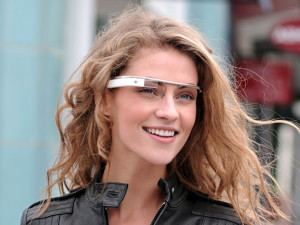Google Glass Glitch
May 2, 2013
Google Glass, the latest breakthrough in technology, is an innovative device that can literally be called a “wearable computer.” It resembles a pair of traditional eyeglasses that sits directly above the user’s line of sight; yet when worn, it can present a display equivalent to that of a 25-inch HD screen eight feet away. Its cutting-edge functions will undoubtedly revolutionize society and change the way we think, live, and interact with others; however, its various high-tech abilities have the potential to threaten people’s privacy.
The spectacles come equipped with a multitude of functions, including web browsing, photography, GPS, and text messaging, all of which can be manipulated using simple voice commands. Because the gadget is designed to be worn full-time, Glass is able to follow us through our social, as well as personal lives, by way of the lenses—images and information of our school and workplace, the most frequently visited stores and restaurants, and even our homes will be easily accessed by many. With data collected from Glass, companies may be provided with information for developing ads targeting individuals with particular tastes, interests, and backgrounds. Aside from targeted ads, there are limitless possibilities of anonymous individuals manipulating our private information for their advantage.
Another major concern is the product’s built-in, 5-megapixel camera that can record video in 720p. Using the simple voice command, Glass users may covertly capture photos, audio, and video without the subject’s consent. Whereas usage is hard to conceal on traditional cameras and mobile phones, taking photos and videos with Glass is far less difficult to detect because it requires no motion to perform the action. The device displays a red light when the video is recording, but many testers have pointed out that the indicator is hardly detectable.
Of course, many public sites, such as AMC movie theaters, have banned the use of this device in its cinemas. However, what law has ever fully successfully kept crooks from crossing the line? Certainly, when there is a law, there will also inevitably be lawbreakers.
With such incredible functions that Glass provides, there are sure to be unlawful citizens who will take advantage of these utilities. Many people who become aware of Glass’s ability to discreetly record everything they see and hear will find it difficult to hold private conversations in public, fearing that whatever slips out of their mouth will be heard or recorded. People should be able to speak and act without fear of being published or persecuted; with Glass, however, this right may become compromised.
Though Glass appears to be a revolutionary invention that could add tremendous convenience to our daily lives, there will also be major setbacks. Google should certainly increase precautions to ensure the privacy of its consumers and society. It’s even more important, however, that the everyday person remain wary of the potential threats of the invasion of privacy, because if overlooked, they could result in catastrophic consequences.









